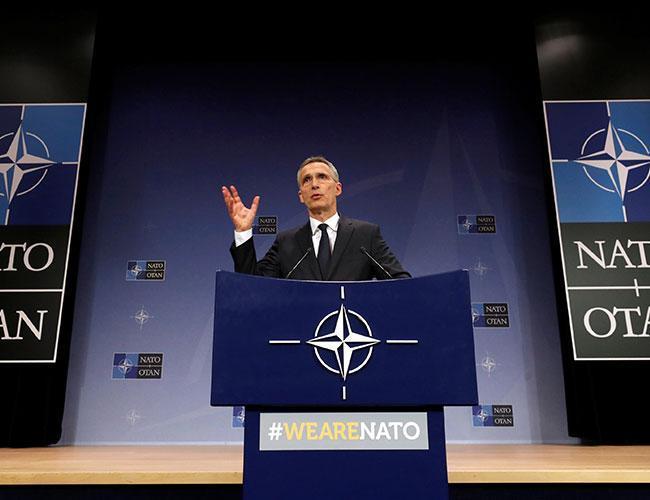
NATO Secretary General Jens Stoltenberg has reiterated Turkey’s importance to the joint defense of the alliance, saying a look at the map is enough to recognize the country’s value, amid rising criticism of Turkish actions in the media and in Western capitals.
“Turkey is a highly valued ally. Turkey is important for our shared security. Not least in the fight against terrorism because Turkey has provided infrastructure basis for the efforts to the global coalition to defeat [the Islamic State of Iraq and the Levant] ISIL. We are grateful for Turkey for that,” Stoltenberg told a group of Turkish reporters in Brussels late on April 27.
“It’s enough to just look at the map and see the strategic geographic location of Turkey, bordering Iraq and Syria, bordering the turmoil and violence that is a threat to Turkey and to all other NATO allies,” he added, in response to questions about criticism over Turkey’s formation of a three-way partnership with Russia and Iran on Syria.
Turkey has been a key member in the fight against terrorism in all its forms and has a strong army that contributes to different NATO missions and operations, Stoltenberg stated, stressing that Ankara is part of every decision taken, on equal footing with other allies.
“Turkey sits around the table every day. I meet with Turkey’s permanent representative to NATO several times a week, around the table where the North Atlantic council meets. We never take decisions without consensus,” he said.
‘Stronger together’
Stoltenberg noted that Turkey is one of the leading nations in NATO’s mission in Afghanistan with several hundred professional and dedicated troops, which have been there for many years and will lead NATO’s High Readiness Joint Task Force in a few years.
He also referred to NATO’s contributions to Turkey’s security, through a significant allied presence in the air, on land and at sea, as well as two air defense batteries deployed by Spain and Italy for Turkey’s air defense.
“Turkey provides key capabilities to NATO but NATO allies also provide support to Turkey. That’s how NATO works. It’s one for all and all for one. We’re stronger together than alone. NATO is good for Turkey and Turkey is good for NATO. I think we have seen that since Turkey has joined the alliance: We are stronger together,” Stoltenberg said.
‘Turkey has the right to protect itself’
One of the issues creating concerns within the alliance is ongoing tension between Turkey and the United States over the latter’s continued partnership with the Syrian Kurdish People’s Protection Units (YPG), which Ankara considers a terrorist group linked to the outlawed Kurdistan Workers’ Party (PKK). The U.S. says its tactical and temporary partnership with the YPG is essential in the campaign to defeat ISIL in Syria.
Stoltenberg noted that Foreign Minister Mevlüt Çavuşoğlu and newly appointed U.S. Secretary of State Mike Pompeo met in Brussels during the NATO meeting.
“As you know, NATO is not present on the ground in Syria but some allies are. For me, the important thing is that the U.S. and Turkey now talk, have contacts and see how they can deal with the situation in northern Syria in a coordinated way. I welcome this dialogue between Turkey and the U.S,” he said.
On a follow-up question on whether NATO views the YPG as a terror organization or just a threat against Turkey, Stoltenberg recalled that NATO “does not have an official list of terrorist organizations.”
“We recognize that Turkey is the NATO ally that has suffered most from terrorist attacks. Turkey of course has the right to protect itself and we expect it to be done in a proportionate way. Turkey has the right to protect itself because Turkey has suffered from many terror attacks,” he said.
‘Turkey and Greece should resolve problems through dialogue’
Another growing source of tension within the alliance is an unresolved dispute between Turkey and Greece over the Aegean Sea.
“Turkey and Greece are two valued allies. They have been members of the alliance for many decades since the 1950s. I appreciate both of their contributions to the alliance,” Stoltenberg said.
“There are differences between Turkey and Greece related to issues in the Aegean Sea. I hope these differences can be solved in the spirit of dialogue and I welcome that the Greek prime minister and the Turkish prime minister have spoken to address these issues. It’s only through this kind of dialogue that these differences can be solved. I have spoken of course with both the Turkish and the Greek authorities. I welcome the fact that these issues are being addressed through direct dialogue between Turkey and Greece,” he added.